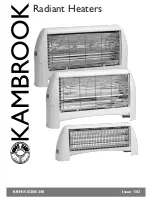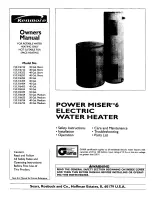
www.desatech.com
114668-01F
8
AIR FOR COMbUSTION AND VENTILATION
Continued
WARNING: If the area in which
the heater may be operated does
not meet the required volume for
indoor combustion air, combus-
tion and ventilation air shall be
provided by one of the methods
described in the
National Fuel
Gas Code, ANSI Z223.1/NFPA 54,
the
International Fuel Gas Code,
or applicable local codes.
VENTILATION AIR
Ventilation Air From Inside Building
This fresh air would come from an adjoining
unconfined space. When ventilating to an
adjoining unconfined space, you must provide
two permanent openings: one within 12" of the
ceiling and one within 12" of the floor on the
wall connecting the two spaces (see options
1 and 2, Figure 2). You can also remove door
into adjoining room (see option 3, Figure 2).
Follow the
National Fuel Gas Code, ANSI
Z223.1/NFPA 54, Air for Combustion and
Ventilation
for required size of ventilation
grills or ducts.
Ventilation Air From Outdoors
Provide extra fresh air by using ventilation
grills or ducts. You must provide two perma
-
nent openings: one within 12" of the ceiling
and one within 12" of the floor. Connect these
items directly to the outdoors or spaces open
to the outdoors. These spaces include attics
and crawl spaces. Follow the
National Fuel
Gas Code, ANSI Z223.1/NFPA 54, Air for
Combustion and Ventilation
for required size
of ventilation grills or ducts.
IMPORTANT:
Do not provide openings for
inlet or outlet air into attic if attic has a thermo-
stat-controlled power vent. Heated air entering
the attic will activate the power vent.
Figure 2 - Ventilation Air from Inside Building
Or
Remove
Door into
Adjoining
Room,
Option
3
Ventilation Grills
Into Adjoining Room,
Option 2
Ventilation
Grills Into
Adjoining
Room,
Option 1
12"
12"
Figure 3 - Ventilation Air from Outdoors
Outlet
Air
Ventilated
Attic
Outlet
Air
Inlet
Air
Inlet Air
Ventilated
Crawl Space
To
Crawl
Space
To Attic
INSTALLATION
NOTICE: This heater is intended
for use as supplemental heat.
Use this heater along with your
primary heating system. Do not
install this heater as your pri-
mary heat source. If you have a
central heating system, you may
run system’s circulating blower
while using heater. This will help
circulate the heat throughout the
house. In the event of a power
outage, you can use this heater
as your primary heat source.
WARNING: A qualified ser-
vice person must install heater.
Follow all local codes.
NOTICE: State or local codes may
only allow operation of this appli-
ance in a vented configuration.
Check your state or local codes.
WARNING: Make sure the
selector switch is in the OFF po-
sition before installing heater.









































